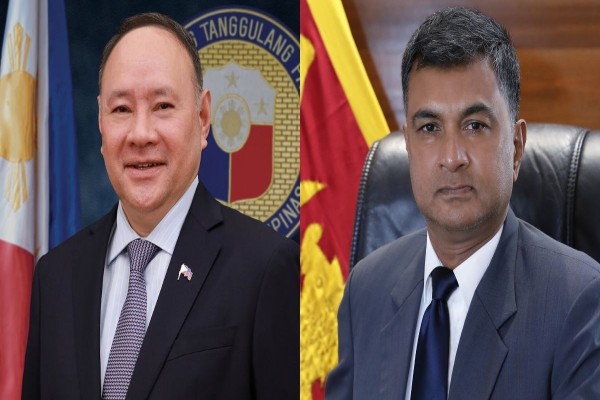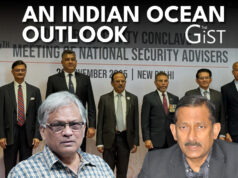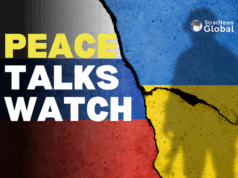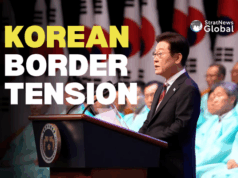Senior defence officials from Sri Lanka and the Philippines underscored India’s growing role as a trusted and principled partner in the Indo-Pacific at the 10th edition of the Indian Defence Conclave in New Delhi on November 4.
Addressing a distinguished gathering of strategic and defence leaders, both speakers highlighted the urgency of deeper cooperation, resilience, and adherence to international law in an increasingly volatile region.
Delivering a recorded address, Sri Lanka’s Defence Secretary Air Vice Marshal Sampath Thuyacontha described the conclave’s theme—“Future Forward: Building Global Partnerships and Indigenous Strength” — as “not only timely, but visionary”, adding that it “represents a dual imperative for our region: the need to deepen strategic collaboration across borders, while simultaneously cultivating self-reliance through indigenous capabilities.”
He said that in an era defined by “rapid technological evolution, unpredictable geopolitical currents and unconventional security challenges”, this dual approach “is not optional, it is essential.”
Thuyacontha commended platforms like Bharat Shakti for their role in fostering regional understanding and cooperation. “They act as vital bridges between governments, military institutions, industry and civil society, offering a space where informed debate leads to actionable outcomes,” he said.
Describing the Indian Ocean as “a defining arena for global trade, energy routes and maritime stability”, he warned that it had become “a critical battleground where traditional threats like piracy now converge with modern dangers such as sophisticated cyber-attacks, climate-driven crises and evolving asymmetric warfare that defies conventional defence strategies.”
He called for collective responses to shared challenges, observing that “no nation can withstand such challenges alone, but we can overcome them together through cooperation.” The Indo-Pacific, he said, was “home to diverse cultures, economies and security perspectives,” and this diversity “is not a source of division but of strength if we approach one another with mutual respect and open dialogue.”
Highlighting the strategic significance of India–Sri Lanka relations, Thuyacontha said, “Both countries have long served as crossroads of trade, culture and dialogue between East and West. This position gives India and Sri Lanka a responsibility and an opportunity to act as a bridge of peace and cooperation in the Indo-Pacific.”
He reaffirmed Sri Lanka’s commitment to maintaining the Indian Ocean as a “zone of peace, where maritime routes are secure, open and free from conflict.” The goal, he stressed, was to ensure that “the Indo-Pacific is not a theatre of rivalry, but a platform for inclusive growth, security cooperation and shared prosperity.”
Referring to the recently signed India–Sri Lanka Defence Cooperation Agreement of April 2025, he called it “a testament to our shared historical relations and to our collaboration and partnership for the way forward.” The agreement, he said, had matured into a “multi-pillar framework encompassing not just naval security, but humanitarian assistance, counter-terrorism, environmental protection, and cyber security.”
He also cited India’s “inspiring” example of self-reliance through the Atmanirbhar Bharat initiative. “Indigenous strength is not isolation; it is the foundation on which strong, equal partnerships are built,” he said, adding that “local capacity, when fused with international collaboration, ensures both strategic autonomy and mutual interdependence.”
Thuyacontha urged the region to “build ecosystems of trust where data sharing, joint training, technological co-development, and crisis response mechanisms are the norm rather than the exception,” supported by “real political will and institutional frameworks that can adapt to the evolving security landscape.”
In conclusion, he stressed the need for “a harmonious balance between global collaboration and national capability, between advanced technology and time-tested principles and between the vision of a secure region and the hard realities we must navigate together.”
Taking the floor live via video link, Philippine Defence Secretary Gilberto Teodoro Jr. echoed many of the same themes, describing India as a “paradigm of what we should aspire to if we become a power.”
Recalling his earlier meetings with Defence Minister Rajnath Singh, he said India’s conduct was exemplary: “India entered into an arbitration with a much smaller country… and though the outcome was not to India’s liking, it complied with the arbitral ruling to the letter, unhesitatingly and willingly.”
Such behaviour, Teodoro said, was “the kind of spirit and behaviour of a power that every country that evolves into a power should aspire to copy.” He noted that “those that are major powers should have the humility to take a look at [India] and perhaps guide their future actions accordingly.”
Describing the Philippines–India relationship as “a greenfield one, though way too late,” Teodoro said it was now being rediscovered with “enthusiasm, optimism and ambition for our shared goals, particularly for ensuring a free and open Indo-Pacific and upholding international norms.”
He praised India’s leadership in “cementing the applicability of UNCLOS in the international domain” and acknowledged joint maritime activities in the South China Sea “as a way of trust and confidence building.” The Philippines, he said, was proud to be “the first foreign recipient of the BrahMos system,” which “adds considerably to our deterrent posture.”
Beyond defence hardware, Teodoro outlined a broad agenda for cooperation with India in “health care, food security, energy security, connectivity and disaster risk reduction,” adding that India had played a vital role in protecting Filipino seafarers “victimised by crimes at sea and other state and non-state-sponsored actions.”
He said the Philippines was studying “India’s systems to ensure resilience and strategic autonomy” and even revisiting “Cautilian politics” and “the India Way” to better understand how India structures its long-term strategic planning. He also noted interest in how “the BJP has structured its politics to ensure continuity in the operation of a strategic plan for India’s rise economically, socially, while preserving and protecting its interests.”
Teodoro warned that “if a country cannot stand its ground… it will be a disservice to future generations if its leadership were to fall down the easier path of abasement.” Commending India’s example, he said it demonstrated “how we should hold fast our own national resilience and our own projections in the international community.”
He cautioned against attempts “to redefine the world order towards the selfish agenda of irresponsible large powers,” calling instead for a “principled collective movement” led by India and like-minded partners “to resist unilateral attempts to justify oppression or expansionism.”
Concluding his remarks, Teodoro quoted India’s National Security Adviser Ajit Doval, noting his distinction between “individual morality and actions of the state.” Citing Doval’s words that “mutual power creates mutual resistance over time and leads to lasting peace,” he said the Philippines was grateful to India “for helping us bolster our defense capabilities and for serving as an inspiration on how to stand up to a bully.”
In a career spanning three decades and counting, Ramananda (Ram to his friends) has been the foreign editor of The Telegraph, Outlook Magazine and the New Indian Express. He helped set up rediff.com’s editorial operations in San Jose and New York, helmed sify.com, and was the founder editor of India.com.
His work has featured in national and international publications like the Al Jazeera Centre for Studies, Global Times and Ashahi Shimbun. But his one constant over all these years, he says, has been the attempt to understand rising India’s place in the world.
He can rustle up a mean salad, his oil-less pepper chicken is to die for, and all it takes is some beer and rhythm and blues to rock his soul.
Talk to him about foreign and strategic affairs, media, South Asia, China, and of course India.





